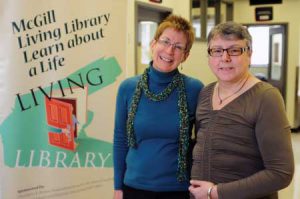
By Neale McDevitt
Next time someone tells you their life is an open book, get them to contact Brenda Shanahan or Trudy Blumstein.
Shanahan, Director, New Residence Hall; and Blumstein, Academic Associate, School of Social Work; are the co-founders of McGill’s Living Library, a project that provides people with the opportunity to access “living books” to learn first-hand about someone’s personal life experiences.
The people who act as living books prepare a story about themselves – sometimes a lifelong journey or maybe just an important period in their life. They can come from all walks of life and the story they tell is of their choosing. With the help of volunteer “librarians” the readers select a title, then meet with their “book” to listen to and discuss the story.
“The Living Library is a unique way for individuals in a very diverse community to get to know each other,” says Shanahan. “It fosters a positive mental outlook among participants and encourages social interaction and cooperation.”
The one-day event – to be held on Jan. 19 at the Redpath Library – enjoyed a successful launch last year, with 21 books telling their stories. The eclectic titles ranged from “Please don’t shout; I’m only blind” and “60 minutes with a Red Man” to “Dear Cancer, thanks for the new career” and “I’m not gonna join the revolution if I can’t dance.”
“We were pleasantly surprised with the big response from post-grad students,” says Shanahan. “It made me realize how many of them are working in fairly independent and isolated environments.”
Shanahan is quick to point out that this is not a seminar series. Most of the interactions are one-on-one or a couple of readers at the very most with a given book. Books are given a little coaching to help them get started and to review their material prior to the event. “Above all, we want to create a safe and comfortable environment,” she says.
“When people feel good they are more willing to reveal themselves.”
The Living Library movement originated in Copenhagen, Denmark in 2000, the brainchild of a group of creative youth workers trying to stem the tide of neo-Nazi violence directed toward the growing populations of refugees and immigrants in that country. Spurred on by the senseless stabbing of a friend, the founders designed an initiative in which stereotypes and prejudices could be broken down through one-on-one or small group encounters.
Although McGill’s recent challenges pale in comparison, Shanahan believes that the University community could use a healthy dose of dialogue. “We recently experienced some disturbing events on campus,” she says. “It is always more productive if people talk to each other rather than shout at one another. Living Libraries is a perfect way to support that process.”
The Living Library; Jan. 19; from 11 a.m. to 5 p.m; Redpath Library. For more information on how to get involved as a book, a reader or a volunteer librarian, go to www.mcgill.ca/livinglibrary/
